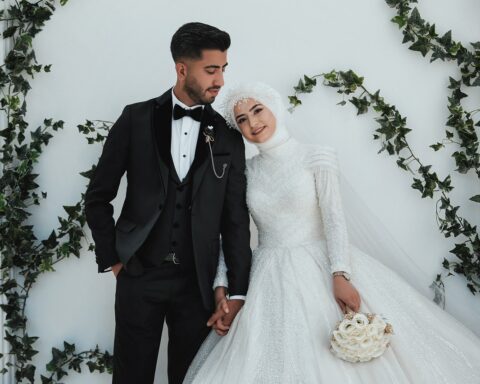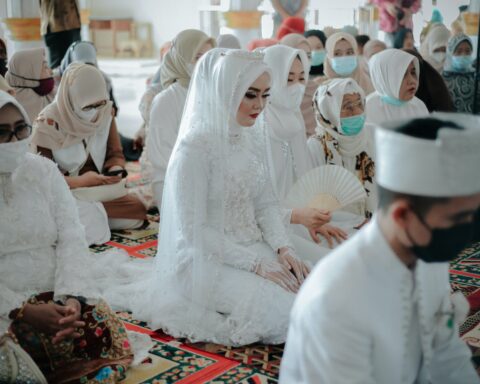In the tapestry of diverse cultures, Islamic weddings stand as a vibrant thread, rich with tradition, spirituality, and community. A beautiful union rooted in faith, an Islamic wedding calls for meticulous planning to ensure a celebration that reflects the essence of Islamic values. In this step-by-step guide, we will explore the sacred journey of planning an Islamic wedding, where love is intertwined with tradition, and the blessings of Allah pave the way for a joyous future.
Step 1: Setting the Intentions
At the heart of every Islamic wedding lies the purity of intention. Before diving into the intricate details of planning, the couple must turn to Allah with sincere hearts, seeking His blessings and guidance for their union. By setting the right intentions (niyyah), the couple embarks on a path where love is strengthened by faith and challenges are met with resilience and hope.
Step 2: Choosing the Right Time and Date
The Islamic calendar holds sacred months and blessed times for significant occasions like weddings. Couples are encouraged to select an auspicious date that aligns with their faith. Consulting local religious authorities or scholars can aid in choosing a date that holds special significance in the eyes of Allah, ushering the couple into a marriage blessed with divine favour.
Step 3: Navigating Cultural Traditions
Islam is a tapestry of diverse cultures, each weaving unique traditions into the fabric of an Islamic wedding. While cultural practices hold immense value, it is essential to anchor these customs in Islamic principles. Embracing cultural diversity while ensuring that every ritual aligns with Islamic values creates a harmonious blend that celebrates the couple’s heritage and faith.
Step 4: Pre-Wedding Arrangements
Prudent financial planning and budgeting are crucial to ensure a stress-free wedding. By meticulously organizing the wedding expenses, the couple can focus on the sacred union, leaving financial worries behind. Additionally, taking care of the legal requirements and paperwork for the marriage contract (Nikah) brings legitimacy and sanctity to the union.
Step 5: Choosing the Venue
Selecting the wedding venue requires thoughtful consideration. The mosque stands as a spiritually enriching option where the couple can seek Allah’s blessings as they exchange vows. However, banquet halls or outdoor locations can also be transformed into spaces that respect Islamic values, ensuring comfort and privacy for both men and women.
Step 6: Selecting the Wedding Attire
The wedding attire embodies cultural symbolism while embracing Islamic modesty. For the bride, a stunning wedding dress that adheres to Islamic guidelines captures the essence of grace and elegance. The groom’s attire, simple yet dignified, reflects the profound commitment he makes before Allah. Seeking advice from religious authorities on appropriate dressing ensures adherence to Islamic etiquette.
Step 7: Planning the Wedding Ceremony
The Islamic wedding ceremony is a profound and spiritual event, bringing the couple together in the presence of Allah and their loved ones. Quranic recitations and soul-stirring Khutbahs (sermons) echo the sanctity of the moment. As the marriage contract (Nikahnama) is signed and witnessed by trusted individuals, the couple lays the foundation for a blessed union.
Step 8: Preparing the Wedding Feast
The wedding feast (Walima) symbolizes generosity, unity, and gratitude. Ensuring that the food served is halal and free from wastage embodies Islamic principles. Couples can embrace the spirit of charity (Sadaqah) by inviting less fortunate members of the community to partake in the feast, fostering a sense of togetherness and compassion.
Step 9: Involving the Community
An Islamic wedding is a celebration of love not only between two individuals but also within the larger community. Involving family, friends, and the local community in the festivities strengthens the bond of the Ummah (community). The collective prayers and well wishes of loved ones infuse the couple’s journey with blessings and support.
What about the Islamic wedding card?
Selecting the perfect Islamic wedding invitations is essential as it represents the couple’s joyous celebration and cultural values. Here are tips to help you choose the right card:
- Islamic Art and Calligraphy: Opt for Islamic wedding cards with elegant Arabic calligraphy and Islamic motifs for cultural significance.
- Bismillah at the Beginning: Start with “Bismillah-ir-Rahman-ir-Rahim” to invoke blessings.
- Quranic Verses or Hadith: Include meaningful verses or Hadith to add spirituality and inspiration.
- Choose Modest Designs: Select designs aligned with Islamic principles.
- Language and Wording: Use English and Arabic to accommodate diverse guests.
- Simple and Elegant Layout: Avoid clutter and opt for intricate Islamic wedding card invitation designs.
- Include Essential Details: Ensure all necessary information is present.
- Eco-friendly Options: Choose sustainable Islamic wedding card options like digital Islamic wedding cards that are in line with Islamic teachings on environmental responsibility.
Conclusion
As the radiant sun sets on the day of an Islamic wedding, it marks the beginning of a journey illuminated by faith, tradition, and love. Each step, from setting sincere intentions to embracing cultural customs and spirituality, forms the mosaic of a wedding that is both meaningful and memorable. An Islamic wedding is a testament to the unity of hearts, where the couple, enveloped by the blessings of Allah and the support of their community, embarks on a joyous path together. May this guide serve as a compass, guiding every couple to weave their love story into the eternal tapestry of Islamic tradition and spirituality.
Must Read – The Elegance of Muslim Wedding Cards: Embracing Tradition with a Personal Touch







